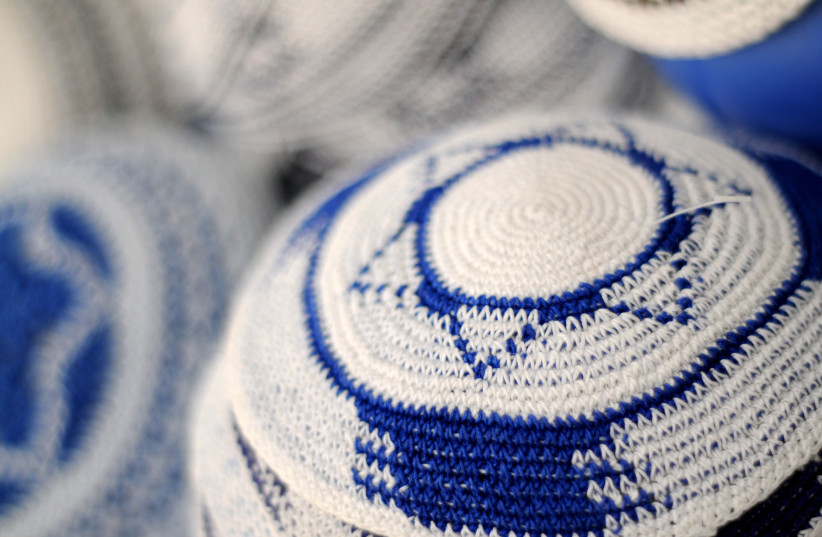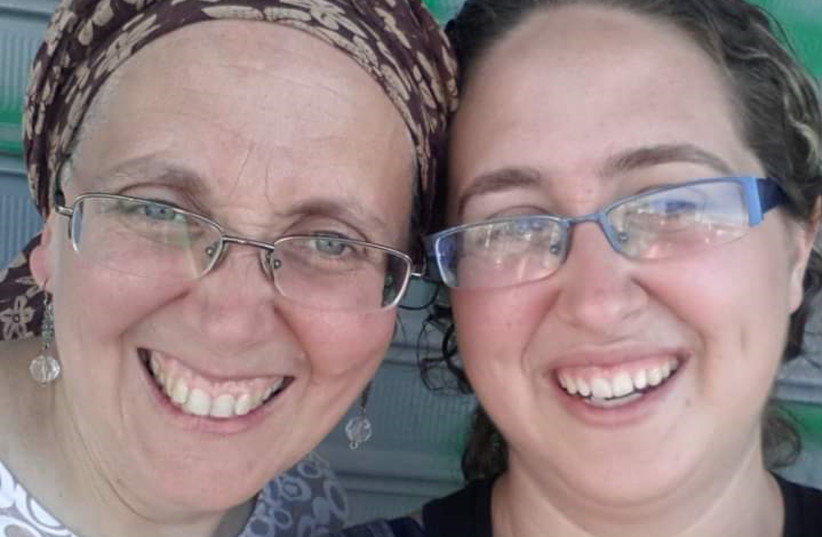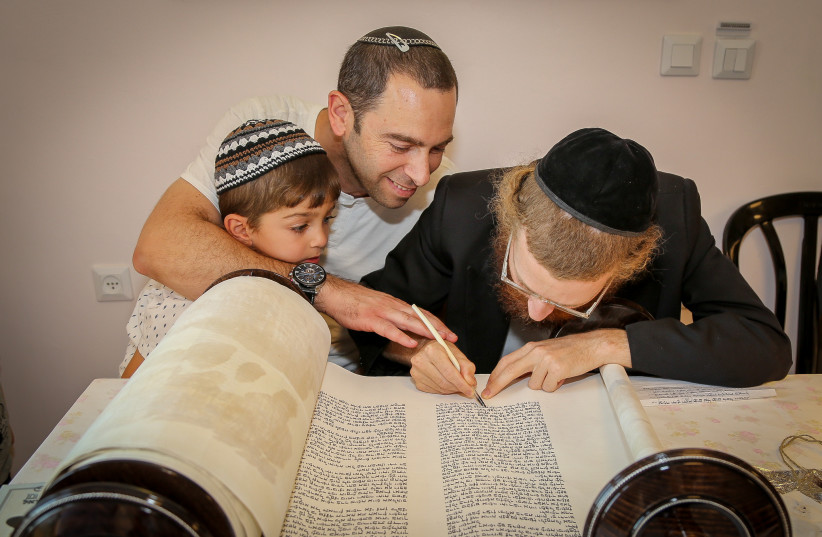What happens when an adult child who grew up in a Torah-observant home decides to live a secular life?
Reading books like Unorthodox: The Scandalous Rejection of My Hasidic Roots by Deborah Feldman and All Who Go Do Not Return by Shulem Deen, written by those who left a Torah lifestyle, one could easily conclude that adult children who turn their back on their family’s religious lifestyle are cruelly and permanently shunned.
Yet, all around us are families that have found ways to navigate their religious differences. We focus here on three Torah-observant families that have one or more adult children who identify as secular, but there are many other families navigating other kinds of religious differences. These include secular parents whose children become religious and married couples where one partner is observant and the other is not.
<br>A mother and her son
THE MOTHER: Diane Abraham (all family names changed) lives in Jerusalem and identifies as liberal Modern Orthodox.

“We have four children – two are Torah-observant, one [who lives in the US] keeps kosher but not Shabbat, and Yossi is not religious at all,” she said by way of introduction.
“We have four children – two are Torah-observant, one [who lives in the US] keeps kosher but not Shabbat, and Yossi is not religious at all.”
Diane Abraham
Upon learning about the variant paths two of her sons chose, Abraham explained, “I was disappointed, but more for them than for me. There is a funny story. Yossi, at age 15, asked to make an appointment to speak to my husband and me, and of course we got very nervous. I thought he was going to tell me that he got a girl pregnant.
“He very haltingly said, ‘I’m sorry, but I think I’m an atheist,’ and I was so relieved I laughed. I said, ‘Thank God nobody is pregnant!’
“I think keeping Shabbat and kashrut is a good way to live your life, and [doing so] has enriched my life tremendously. As long as he is in Israel, I’m not too concerned, but he wants to move to the US, and I am, of course, worried that he might marry someone not Jewish.
“At the same time, our son Noam in the US has become more observant since he moved there three years ago. He has an Israeli girlfriend, and the two of them are the de facto Friday night hosts for anyone who keeps Shabbat. He also puts on tefillin every day, which makes me very happy.”
How do the observant siblings deal with their brother who is a self-proclaimed atheist?
“Our kids are all very close and seem to just accept how they are. But the nonobservant kids are careful not to do anything that would offend their siblings, either,” Abraham reported.
“I very much encourage my nonreligious son to be at the table for Kiddush, etc., but I no longer insist he put on a kippah.”
Yossi, who is in the army, lives in his own private space in the family home.
“We will tell him when we’re eating, but if he is too tired or doesn’t show up, I’m not going to argue with him. At the same time, I won’t make everyone else wait until he decides to show up,” she elaborated.
Abraham worries “that my grandchildren won’t be religious or perhaps even halachicly Jewish.” At the same time, she acknowledges that “the secret is mutual respect. He is making a principled decision that I disagree with, but he is an adult and entitled to make his own decisions, even if they’re wrong.
“For Yossi, it is that he does not believe in God. I asked him recently if he misses keeping Shabbat, and he said, ‘I so wish I could believe, but I just don’t.’ At the same time, he goes around helping people who need it and is sensitive to anyone who is in need.

“The advice I would give is that you can’t force your child to be religious, and if you try to do so, you may destroy your relationship with him. You can demand that he respect the rules of the house, such as no phones at the Shabbat table, etc. We also made a decision that if he wants to take our car on Shabbat, after we finish eating, we let him. I was at first worried that my youngest son would also stop keeping Shabbat after his two older brothers did, but that does not seem to have happened.
“Michelangelo once said that when he looks at a block of marble, he would see the statue that was already there, and his job was just to chip away the extraneous marble. That’s how I feel about parenting. The child is there inside, and my job is just to help him be what Hashem [God] wants him to be.”
THE SON: Like his mother, Yossi, now 21, identified that the shift in his perspective started when he was a young teen.
“At 13, at my bar mitzvah, I started to become much more religious and really connected. At the age of 14, I started to ask questions. In retrospect, I think that my bar mitzvah, the strengthening of my religion, led me to ask the questions in the other way. At 14, I stopped believing, but I waited until 15 or 16 to stop keeping Shabbat. By the age of 18, I stopped keeping kashrut.”
Yossi Abraham
“At 13, at my bar mitzvah, I started to become much more religious and really connected. At the age of 14, I started to ask questions. In retrospect, I think that my bar mitzvah, the strengthening of my religion, led me to ask the questions in the other way.
“At 14, I stopped believing, but I waited until 15 or 16 to stop keeping Shabbat. By the age of 18, I stopped keeping kashrut.”
Yossi recalled the same pivotal conversation. “I went into my parents’ bedroom and I said, ‘I’m asking questions and I’m curious.’ I didn’t immediately go to the part that I don’t want to be religious. [I said] that I wanted to talk to more rabbis and see what the deal is.
“They encouraged me to search in myself and search in others and try to find my own answers. They were very supportive and willing to accept me as I was, even though I know that they do want me to be religious.”
Yossi’s earliest conflicts arose from how he understands the Torah perspective on homosexuality. “One of the first things that bothered me was [other people’s sexual orientation]. In the family, we’re liberal and believe in science, and most research shows that being gay occurs among animals. It’s considered something we don’t really have much control about.
“If it’s something you really don’t have control over, why would they make something like that illegal in the Torah and make certain people’s lives so difficult? [This] made me question the belief of God. How could a book that’s so loving have all these laws against certain people?
“I don’t identify as religious because I just don’t believe in God. I consider myself atheist for the most part. That is what led me to be not religious. In general, I do like the idea of being religious. I think it’s nice to have the community and [to believe] that no matter what happens, it’s okay because of God.”
He explained that, in his view, being religious means “As long as I live with this set of rules that are in a book, I don’t have to struggle with what ethics is, how life should be lived, what is a waste of a life, what is not. It’s all very simply put in a book, and I don’t have to struggle with anything myself. That’s what’s difficult for me about being religious.”
Nevertheless, Yossi affirmed, “I am very culturally Jewish. I celebrate the holidays with the family and sometimes also go to synagogue.
“I get along great with my siblings. My older sister is very religious. [She] is very, very strict, even more than my parents. My older brother believes, but he’s not religious and also lives [outside Israel], and my little brother is also religious. I do feel like my little brother is a little bit in a box, and I do kind of want him to question a little bit more just so he can make his own decision a little bit better.”
Despite their differences, Yossi said, “I have a very close relationship with all of my family. Because we are such an open family, and we really share a lot and we’re very open and loving no matter what, it’s not so difficult really that I’m living a different life than my parents.”
He lives in a separate space from his parents, where “I can be not religious on Shabbat.”
When he goes to visit his parents, he doesn’t bring electronics with him, aside from a phone, in case of emergency. “I will be religiously observant in their house. I try to go there for Shabbat meals because I know it’s important to them to have family time.
“We will always have a healthy relationship, as long as we maintain mutual respect for one another, regardless of religion or anything else that can come in between us. My parents and I have a great amount of respect between us. I love my family a lot.”
Yossi advises other families to remember, “Everyone has their own path in life. Try to see the good things about each side.
“I like the idea of mitzvot and how they try to convince us to live a more ethical life. If you have non-religious children, you can still see how, if you raise them right, they will be ethical people and have kavod [respect for others]. A big part of the Torah is having respect and kavod for one another.
“A lot of it has to do with just being a good person, which is something that a lot of nonreligious people also have. So look at their midot [personal qualities], even if they don’t believe in the same book or the same god or believe in God at all, as long as they still have good midot, to appreciate them and respect them. Each person should live his own path and his own life,” he asserted.

A mother and her daughter
THE MOTHER: Devra Ariel lives in Pnei Hever and identifies as National-Religious. Her oldest daughter, Ellie, is not observant.
Devra describes her initial reaction to learning that her firstborn child did not share her Torah values in this way. “I was disappointed and sad, but not surprised. It was definitely a process. In retrospect, there were things I didn’t notice. I don’t know if I was lying to myself or I really just didn’t see. But that was only initially. I love my daughter, and she’s an amazing human being. I choose to focus on that.
“All of our kids have chosen their own paths, and we understand and accept that they are adults. We love them regardless of their paths. We see how amazing each and every one of them is, and we celebrate that.”
“All of our kids have chosen their own paths, and we understand and accept that they are adults. We love them regardless of their paths. We see how amazing each and every one of them is, and we celebrate that.”
Devra Ariel
The other siblings and their spouses “all love their sister very much and do their best to accept her for who she is.”
While Devra and Ellie share an open relationship, it isn’t always comfortable for Devra to hear details about her daughter’s secular lifestyle.
“I’d rather have communication than not have it, but parts of her life are painful for me to hear about,” she acknowledged.
Although Ellie now lives in Jerusalem, she lived in the family home during COVID. “If we talked Torah at the [Shabbat] table, Ellie would just leave the table and go read. That was fine with us. For us, the main part is the togetherness.”
Devra hopes this story she tells will help other parents whose children have chosen a different lifestyle.
“When I was becoming religious, a friend remarked that he hoped that his children would be ba’alei teshuva [returnees to Torah observance] just like him. I took that to mean that he hoped his children would have the same excitement for Torah Judaism that we have. I told this story to [a family] psychologist and then mentioned how it wasn’t easy for me that my daughter is not religious. The psychologist said to me, ‘What do you want? You searched and found your own answers, and you raised your daughter to do the same thing!’
“I think that’s profound. I think nonreligious children of religious parents, or vice versa, are just one aspect of how our children make different choices. As parents, we need to see how our children are amazing, even if some of their choices are not the ones we make. Unconditional love (meaning, I love my kids regardless of their choices) and seeing the good (and especially the amazing) are vital in parents’ relationships with their children.
“I have to add that our positive relationship would not be possible were my daughter not respectful and loving. We ‘hold our breath’ sometimes, and so does she. We both want this relationship,” she concluded.
THE DAUGHTER: Ellie, 30, grew up in Ma’aleh Adumim and defines her family as “a little more strict religiously than the general National-Religious community.” Like Yossi, her spiritual doubts emerged early. “Since I was 10 years old, I remember having questions about where God started, and being jealous of the youth in our community that had left the religious world.
"Since I was 10 years old, I remember having questions about where God started, and being jealous of the youth in our community that had left the religious world."
Ellie Ariel
“As an older teen, the issues I had started with the rabbinic world, questions of why certain people get to dictate how we live our lives, then questioning the existence of the ‘Jewish’ God.
“Today, I don’t have an answer if there’s a higher power who runs the world or cares what happens here. I don’t believe in olam haba (the World to Come). I try to be the best person I can, regardless of a God. I never felt really part of the religious world. I left without anger or the need to push away.
“Even as a little girl, I felt comfortable asking my mom questions about God. I had ups and downs in my relationship with Hashem and the religion. When I was nearly 20 years old, I finally told my mom I wasn’t observant.”
That revelation was preceded by conflict. “The ‘coming out’ as not religious was after many arguments with my mom about the music I [listened to] in the house that my younger siblings were exposed to, the movies I watched and the choice to wear pants.
“Finally, after a heated argument, my mom asked me straight-out whether I was religious or not, if I keep Shabbat. That was when I said no. After that, the arguments basically stopped, and we were able to have a good relationship again.”
For now, harmonious relationships exist with all four of her siblings, but Ellie does wonder how that will play out as her siblings’ children get older. “My siblings are the most important people in my life. As long as they are willing to have me around, I’ll be there. I think once my nephews get older, it will be more complicated and will take more effort from us to continue getting along.”
Ellie admits that the hardest part of choosing a secular life is “the fact that I won’t have the option of living near [my parents] or my siblings. They all live in religious settlements. My political opinion shifted to the Left after leaving the religious world. I won’t live in a settlement and obviously not in a religious community, either.”
Today, the Ariel family has found a peaceful formula. “My parents never pressure me into coming to them for the holidays. I know I am always invited, and they understand why it’s difficult for me. When I am over for Shabbat, I make sure to wear a dress and look nice for Shabbat. I participate in the ceremonies and take part in preparing for Shabbat.
“I have never had either of my parents ask me about what I do in my room behind closed doors. Never did they say I can come to them only if I promise to be observant in their house.
“There’s a lot of mutual respect and love,” she emphasized.
Nevertheless, she shared, “It’s not always easy. Even within the religious world, my siblings are in different places from each other and from our parents. We work at it, at acceptance. We love each other, and that is more important than everything. We do argue and get frustrated at times, but we know that the safest place is with each other.”
Ellie has advice for other young people “who are finding their way out of the religious world. Often I hear kids talk about their parents not accepting them, since they ask them to dress a certain way at home or since they still pray for them to be religious.
“You have to acknowledge that this isn’t the life your parents imagined for you. They are allowed to be sad about your choices.”
“You have to acknowledge that this isn’t the life your parents imagined for you. They are allowed to be sad about your choices.”
Ellie Ariel
To parents, she advises, “Focus on what [you] have in common and be open and honest about each other’s boundaries. Communication is key.
“I think it’s easy to focus on the difference within families when a child goes off the derech [becomes secular], but there are always differences, and children are rarely able to fulfill all their parents dreams. We, as individuals, all have our way of walking through life, and as long as we are able to really see each other and each other’s needs, we can be happy,” she advised.

A haredi father speaks
Rabbi Chaim Goldman (not his real name) spends his days learning and teaching Torah. He describes how he has learned to navigate his relationships with two sons who are no longer Torah-observant.
“As a haredi father who tried hard to raise my children to live the same level of Torah life, it was difficult to watch one son, and then another after him, begin to turn away from a Torah lifestyle. There is a sense of failure and hard-to-avoid embarrassment while living around people who did not have the same problems.
“While they are still young, this results in anger and arguments, threats and punishments, all of which tends to have the opposite of the desired effect.
“When it became obvious that I was powerless to change their directions, I had a choice of cutting them off, as many have done in similar situations, or finding a way to keep them in the family, despite their very different secular lives.
“A turning point came for me when I read a book that discusses the Jewish understanding of reincarnation, after which I came to understand two things. First, every soul is on a personal journey that is unlike anyone else’s. Second, not every person has the same spiritual nature and opportunity.
“These two realizations allowed me to put my disappointment and anger aside and to work on mutual love and respect instead. Clearly, my sons appreciated this because they wanted to remain close members of the family, and are to this day. They even help me with my work as well on a regular basis.
“I also realized that if they were ever going to find their way back to Torah, it wasn’t going to be by being rejected by me or the rest of the family. They would have to feel loved and respected to remain connected on some level.
“It is also important to keep in mind that as much as our children are a reflection of who we are, they are still very different people. You have to know who you are and what you believe, and that self-assurance and confidence gives a person the ability to be anywhere and with anyone and still act and feel themself.
“People see me with my sons and how different our lifestyles are. They may have questions about how they did not follow in my path like so many other haredi children have done with their parents. But they also notice my love for my sons despite our differences, and I have been approached by some who have told me, ‘I really admire the way you are able to be so close to your sons despite your religious differences.’
“That has to be worth something,” he said hopefully. ■
<br>Learn more
Articles, books, documentaries and podcasts
- Adina and Eric Yoffie: “A Different Path, Still Family” – 18forty.org/podcast/adina-and-eric-yoffie-a-different-path-still-family/
- Black Becomes a Rainbow: The Mother of a Baal Teshuvah Tells Her Story, by Agi U. Bauer
- “Coming Apart, Pulling Together” – married couples where one spouse is religious and the other is not. mishpacha.com/coming-apart-pulling-together
- Leaving the Fold – documentary about five young adults who leave Orthodoxy. youtu.be/H8Dkccqm8oY
- Od Nipagesh – Israeli reality show exploring religious and secular family relationships. Season One has English subtitles. www.kan.org.il/page.aspx?landingpageid=1209
- Off the Derech: Why Observant Jews Leave Judaism, by Farank Margolis
- Off the Derech: Leaving Orthodox Judaism, edited by Ezra Cappell and Jessica Lang
- What Do You Mean, You Can’t Eat in My Home? A Guide to How Newly Observant Jews and Their Less Observant Relatives Can Still Get Along, by Azriela Jaffe
- “We’re Best Friends” – unityday.org.il/were-best-friends
<br>Organizations and online resources
- Footsteps – US-based support for those who leave the haredi community. footstepsorg.org
- Frum/OTD Dialogue Group on Facebook – respectful dialogue between religious and secular Jews. www.facebook.com/groups/1154185494716307
- Makom – helping disenfranchised haredi Jews find a positive place in Orthodoxy. jewinthecity.com/makom-landing
- Out for Change – empowering young people leaving the haredi world to integrate into mainstream Israeli society. www.leshinuy.org/en/out-for-change-2
